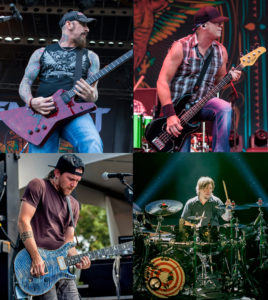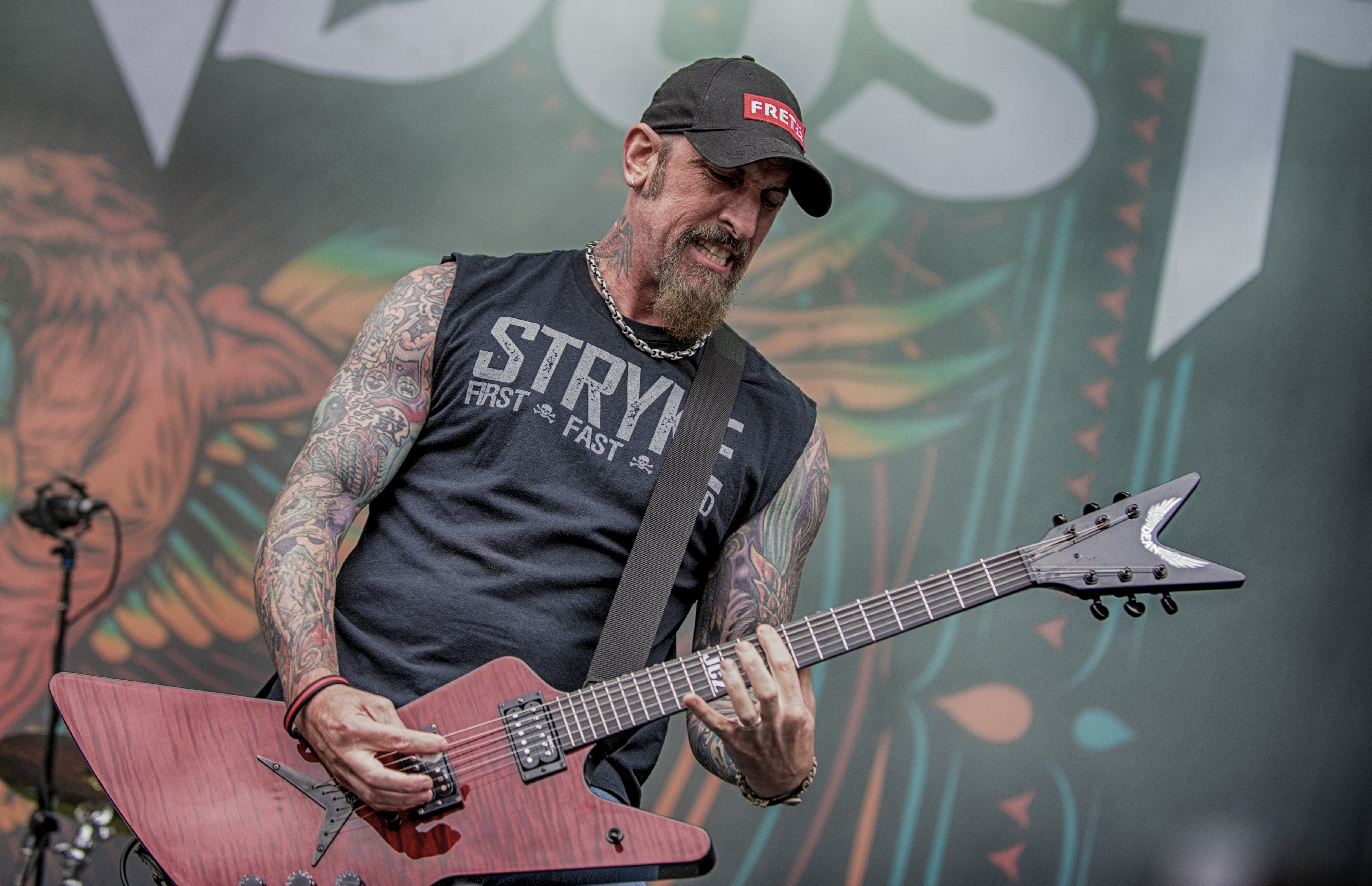Double Duty: A Conversation With Projected/Sevendust Guitarist John Connolly
Guitarist John Connolly knows where his bread is buttered — that being at the table of Sevendust, the highly acclaimed rock band that has been drilling wanton ears with their unique hybrid of alt-metal/rock for 20 years now.
But in today’s music climate of bands releasing one album every few years, artists like Connolly need outlets for releasing that which flows within: music. And for the New Jersey-born Connolly, those needs are filled by his side group, Projected.
The four-piece consisting of Connolly and Sevendust bandmate Vinnie Hornsby (bass), Scott Phillips (Creed and Alter Bridge) on drums, and Eric “E-Rock” Friedman on vocals, came together in 2012 and released their debut album, “Human,” that same year. The band went its separate ways soon thereafter to perform with the acts that got them there, but five years later, the quartet reconvened once again, this time to compose and release Projected’s sophomore album, “Ignite My Insanity,” this July.
Connolly spoke with ListenIowa following the release of the album’s second single, “Ignite.”
What is the writing process for you guys with Projected? Is it different than with Sevendust?
It can start from anywhere. With Sevendust, ideas can come from any of the five cooks that are in the kitchen. With Projected, it’s a little bit different in that, usually, everything starts with an idea that I’ll have, which is kind of a strange spot for me to be in. In one band, you take on the burden of throwing the weight on you, and in the other, you’re looking around wondering who is going to throw an idea out there. The guys let me take the ball and run with it, and once I get the frame of the hous

With everyone in the group having his “first priority” band, scheduling has to be difficult at times, I’m guessing.
Anytime we have a gap, we go, “Alright, how many golf tournaments do you have coming up?” (laughs) It wasn’t intentional for us to have a five-year gap between albums, but we find time to pull things off. We’re flexible. We set a target, and eventually we get around to making music.
A lot of artists in the rock community these days are putting bread on the table with side projects. But for some, it’s simply another artistic outlet. What’s your take on this?
The unique thing about Projected is that we never put the weight on it to put the bread on the table. This is more of an outlet to have fun. Sevendust and Alter Bridge kind of give us the ability to take a step back and say, “We’re going to do this, and if it sells it sells, but we’re going to do this either way.” We’re super conscious about the budgets, and the records are done tightly and are super organic. We don’t overthink it. We don’t rewrite and go over the same song 16 million times. Tool is notorious for taking 1,000 years to make a record. We don’t do that. We make art to make art.
What was the genesis of Projected?
We knew the project was going to be myself, Scott and Vinnie, and we were over at Mark Tremonti’s house listening to Tremonti songs. The conversation turned toward what we’re going to be doing in the off time. So we played some music there and E-Rock said, “I want to get in on this,” and I said, “OK.” And he said, “No, I’m serious,” and I was like, “Me, too.” (laughs) It was that easy. We never sat down with a sheet of paper and said these are going to be the four dudes in the band. It just happened.
Was making your debut album, “Human,” a different experience than the new one?
The first time around was a complete experiment, but the second time was easier because we’d built the template. That’s not to say that on song 17 of 21 you’re not looking around and going, “Alright, I need some perspective here. Somebody tell me if this sucks.” (laughs) It’s very easy in Sevendust. You could have your best riff ever, walk in there, and the other guys go, “Yeah, that’s pretty cool” — which is a death sentence. (laughs) With Projected, there’s a lot of latitude.
Is writing for two bands difficult? Or is it a case of just getting yourself in a certain mindset and letting the music come out naturally based on that parameter?
It’s a double-edge sword. You can get demo-itis bad, fall in love with something and come back three days later and wonder what you were thinking. The cool thing is, if something doesn’t stick in one band, now you have an outlet for it in another. You don’t have to force it into either world. There were a couple of songs I thought were going to be Projected songs that ended up being Sevendust songs. When you’re making music with four other guys who have super headstrong ideas about what kind of record they want to make, it’s not that often that all five of us are on the exact same page. That’s Sevendust. Typically, one guy wants to make a “vibey” record, and another guy wants to make the heaviest record of all time, and then the other three are kinda stuck between those two. Then you find a way to marry it. Projected is cool for me, because you never know what’s going to end up where.
Where does Sevendust stand in the big picture of things for you, then, at this point?
Oh, it’s always No. 1, and will be. I get to do Projected because Sevendust is as important as it is. There’s always that consciousness of wondering, “What’s going to happen if people like this (Projected) better?” But I’m meeting people who are getting introduced to Sevendust through Projected. For me, that’s a win-win. I love Projected, but there’s something about Sevendust. If I wasn’t in Sevendust, it would probably be one of my favorite bands of all time. (laughs)
Do you find it odd that someone would NOT know about Sevendust?
It’s funny. I was watching some video and Tommy Lee was sitting in a bar somewhere asking somebody about Motley Crue, and the guy is just sitting there looking at him like he has eight heads. (laughs) Being in it for 20 years, you’d expect that most people would have at least heard of us, but there are so many people out there, and so many bands. There’s so much noise that sometimes it’s hard to break through and connect with as many people as you think you are. But yeah, when I hear people say they heard of Sevendust through Projected, I always warn them, “Fasten your seatbelt. You’ve got a 20-year ride with 11 records ahead of you.”
What is the state of the music industry these days in your mind?
It’s one of those tough things. When Metallica took on Napster it backfired. Even though they were saying the right thing, people looked at them and thought they were greedy. But Lars was right. If you give something away, certain people will take advantage of it and share it. It’s not a lot different from back in the day when we’d take vinyl and put them on cassettes and make mix tapes, but the difference is, now it’s exact. A tape can run fast or slow, have some hiss or noise. It’s not identical. But with file sharing, it’s the same. With YouTube, people post an entire record there, and all of a sudden it’s free. It’s tough, but it works on both sides of the fence. Now, it’s that much easier to make it. Back in the day, for “Animosity,” with marketing and videos and everything, we probably spent close to $5 million on that record. You don’t do that these days. For $50,000, or a $100,000, you can make something that sounds twice as good, and you can get it out there. With Projected, everything happens at home, and there’s something to be said about it. I agree that if you were to go to a studio and work with a certain producer, you’ll get a good product, but there’s a certain thing that happens when I’m at home and making music. It’s a different headspace. There’s something to be said about sleeping in your own bed, especially when you’ve spent 20 years riding around in a bus. For me, to be able to make music at home, it’s hard to put a price on that. It’s hard to put a price on how the creative process is affected by that.
But is there anything left to be said about going to an actual studio, though, with the high ceilings, floors built a certain way, etc.?
At the end of the day, the song is key. I’m super comfortable making music in my house. If I travel, and I’m in a hotel, and I’m missing my family, it may affect the songwriting. That could be good if you’re looking for that angst or loneliness or whatever, but if you’re trying to get comfortable, for me, if you give me the option, I’d rather be at home. If you’re having a good day, great. And if you having a bad day, you just shut the rig down, go grab the family, go watch a movie, have dinner, hang out with friends. It’s so much easier to unplug without sitting there thinking, “I’m wasting people’s time, I’m wasting people’s money, the budget’s gonna go crazy.
Then things become more about the money than the music.
Yeah, and that’s a weird spot to be in. It definitely gets in the way of the art. It’s cool if you want to go to Electric Lady (studio) and have the experience that (Jimi) Hendrix did, but if you’re sitting there and thinking that you didn’t have a good day, you’re wondering, “How much did that cost?” For me, at home, none of that is in the math. I’m paying the mortgage either way. (laughs)
Rhetorical situation: A kid is outside the venue where Projected is going to play, looking at the gig poster, and says to his buddy, “I wonder what this group sounds like?” You happen to be walking by and hear him say that. What do you tell him?
It’s really heavy. It’s really not heavy. (laughs) It’s a little bit of both. It’s loud and melodic. It’s the sum of all the parts that came before us. If you’re a Sevendust fan or an Altar Bridge fan or a Creed fan or a Tremonti fan, there’s a commonality that goes through all of it. You can hear the pieces of the puzzle, but they’re just put together in a different way. We’re trying to be all those bands in a certain way, because there’s a lot of legacy to live up to.


